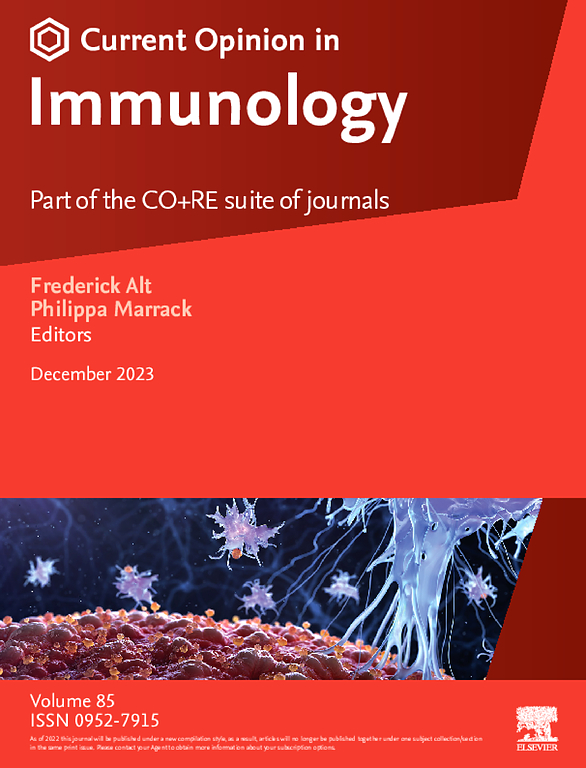类固醇难治性急性移植物抗宿主病的新疗法:最新进展和未来方向
IF 5.8
2区 医学
Q1 IMMUNOLOGY
引用次数: 0
摘要
急性移植物抗宿主病(aGVHD)是同种异体造血细胞移植(allo-HCT)的一种重要并发症,其特征是供体免疫细胞免疫介导的组织损伤。aGVHD的标准治疗涉及全身皮质类固醇,但许多患者没有充分的反应,30%-50%的患者是类固醇难治性(SR-aGVHD),导致预后不良。这突出了对有效的二线治疗的需求。Ruxolitinib是一种JAK1/2抑制剂,已经成为一种关键的治疗方法,与现有的最佳治疗方法相比,在SR-aGVHD中显示出更高的总缓解率。然而,对ruxolitinib的耐药和不耐受需要探索新的和联合治疗,如阿普鲁肽、奈胡单抗和其他靶向药物,这些药物在临床试验中显示出有希望的结果。此外,包括微生物疗法、间充质基质细胞或α -1抗胰蛋白酶在内的非药物疗法也在研究其免疫调节潜力。未来的方向是发展个性化的治疗策略,结合生物标志物和多样化的治疗方式。目的是加强疾病管理,旨在可持续控制和改善面临SR-aGVHD挑战的患者的生活质量。本文章由计算机程序翻译,如有差异,请以英文原文为准。
Emerging novel therapies for steroid-refractory acute graft-versus-host disease: recent advances and future directions
Acute graft-versus-host disease (aGVHD) is a significant complication of allogeneic hematopoietic cell transplantation (allo-HCT), characterized by immune-mediated tissue damage from donor immune cells. Standard treatment of aGVHD involves systemic corticosteroids, but many patients do not respond adequately, with 30%–50% of patients being steroid refractory (SR-aGVHD) leading to poor outcomes. This highlights the need for effective second-line therapies. Ruxolitinib, a JAK1/2 inhibitor, has emerged as a key treatment, demonstrating superior overall response rates in SR-aGVHD compared to best available therapies. However, resistance and intolerance to ruxolitinib necessitate exploring novel and combination therapies such as apraglutide, neihulizumab, and other targeted agents, which have shown promising results in clinical trials. Additionally, nonpharmacologic approaches, including microbiotherapy, mesenchymal stromal cells, or alpha-1 antitrypsin, are also being investigated for their immunomodulatory potential. The future direction is to develop personalized treatment strategies that incorporate biomarkers and diverse therapeutic modalities. The aim is to enhance disease management, aiming for sustainable control and improved quality of life in patients facing the challenges of SR-aGVHD.
求助全文
通过发布文献求助,成功后即可免费获取论文全文。
去求助
来源期刊
CiteScore
13.30
自引率
1.40%
发文量
94
审稿时长
67 days
期刊介绍:
Current Opinion in Immunology aims to stimulate scientifically grounded, interdisciplinary, multi-scale debate and exchange of ideas. It contains polished, concise and timely reviews and opinions, with particular emphasis on those articles published in the past two years. In addition to describing recent trends, the authors are encouraged to give their subjective opinion of the topics discussed.
In Current Opinion in Immunology we help the reader by providing in a systematic manner: 1. The views of experts on current advances in their field in a clear and readable form. 2. Evaluations of the most interesting papers, annotated by experts, from the great wealth of original publications.
Current Opinion in Immunology will serve as an invaluable source of information for researchers, lecturers, teachers, professionals, policy makers and students.
Current Opinion in Immunology builds on Elsevier''s reputation for excellence in scientific publishing and long-standing commitment to communicating reproducible biomedical research targeted at improving human health. It is a companion to the new Gold Open Access journal Current Research in Immunology and is part of the Current Opinion and Research(CO+RE) suite of journals. All CO+RE journals leverage the Current Opinion legacy-of editorial excellence, high-impact, and global reach-to ensure they are a widely read resource that is integral to scientists'' workflow.

 求助内容:
求助内容: 应助结果提醒方式:
应助结果提醒方式:


